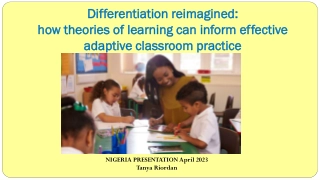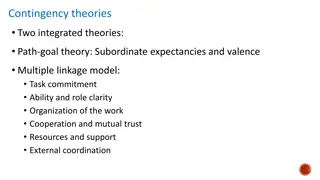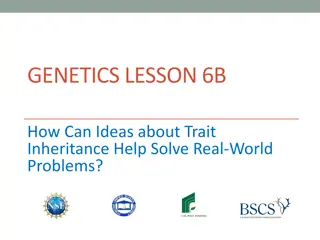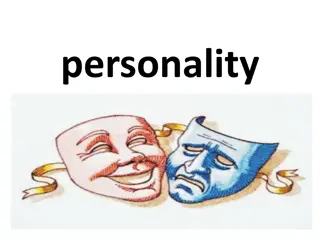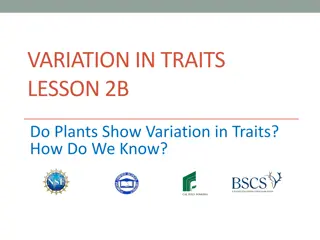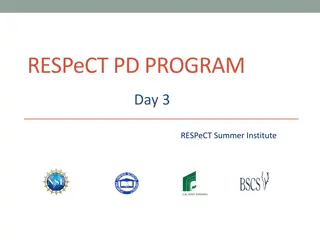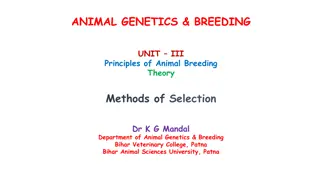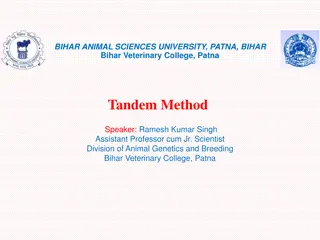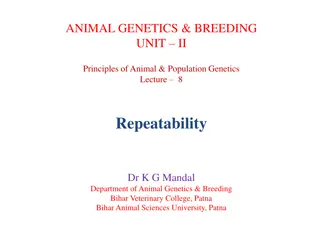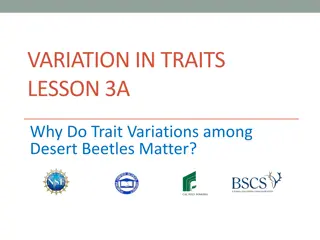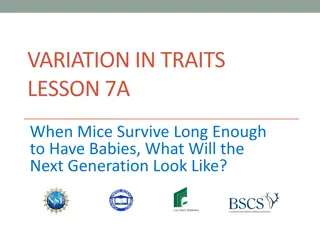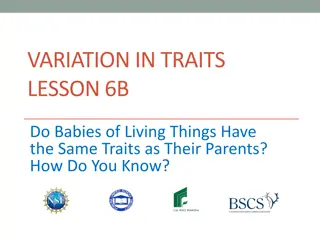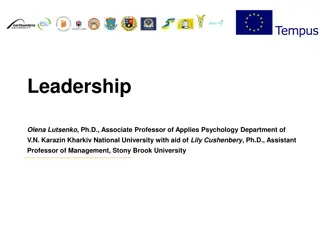Reimagining Differentiation: Enhancing Classroom Practice Through Learning Theories
Explore how theories of learning can inform effective adaptive classroom practice, focusing on the concept of differentiation. The presentation delves into reimagining differentiation, key theories supporting it, and practical strategies to support differentiation in language classrooms. The researc
0 views • 35 slides
Leadership Theories and Power Dynamics in Organizations
Explore contingency theories, dyadic theories, power and influence concepts, and leadership lessons from "12 Angry Men". Dive into the significance of leader-member exchange (LMX), political skills, and the interplay between power, politics, and organizational efficiency.
0 views • 27 slides
Theories Explaining Deviant Sexual Behavior Throughout History
Explore historical theories on deviant sexual behavior, including demonological, anomie, psychoanalytical, human ecology, and somatotyping theories. These theories range from supernatural beliefs of possession to scientific interpretations of societal influences and individual characteristics.
2 views • 33 slides
Testing Extended Theories of Gravity Using Black Hole Shadows
Exploring the shadows of black holes as a method to test extended theories of gravity, this study discusses the existence of black holes, gravitational wave astronomy, and direct imaging. Researchers Oleg Zenin, Stanislav Alexeyev, Alexandra Nemtinova, and Artem Baiderin present findings on black ho
5 views • 18 slides
Insights into Theories of Motivation and Their Application
Motivation, a driving force behind human behavior, is explored through various theories like Maslow's hierarchy of needs, McClelland's learned needs theory, and others. Understanding these theories can help organizations enhance worker productivity by addressing different motivational factors.
9 views • 21 slides
Understanding Key Nursing Philosophies and Theories
Explore the development of nursing philosophies and theories with a focus on prominent figures like Henderson, Orem, Roy, Rogers, Leninger, and Pender. Delve into the historical stages of philosophical development in nursing and the three schools of thought in nursing. Engage in group discussions an
10 views • 12 slides
Understanding Business Ethics Theories and Principles
Explore various business ethics theories including Ethical Concepts, Moral Behavior Development, Ethical Principles, and the Role of Ethics in Business. Delve into the concept of ethics, moral behavior evolution, ethical principles like autonomy, honesty, justice, and integrity, and the importance o
10 views • 17 slides
Managerial Theories and Criticisms
Delve into the world of management theories, from classical to modern approaches, exploring the foundational principles of management, the evolution of theories, and criticisms of traditional perspectives. Learn about the basic functions of management and the insightful perspectives of renowned theo
2 views • 11 slides
Understanding Personality: Traits, Characteristics, and Influencing Factors
Personality is the unique combination of physical, mental, and behavioral traits that define an individual. It encompasses characteristics like smartness, dress sense, attitudes, and values. Personality is influenced by biological, environmental, and situational factors, and can be analyzed through
1 views • 49 slides
Understanding Sickle Cell Trait in Intercollegiate Athletics
Sickle cell trait is a hereditary condition affecting red blood cells' shape and oxygen-carrying capacity. Individuals with this trait can experience complications during intense exercise, leading to health risks in athletics. This article explores the impact of sickle cell trait on athletes, the re
0 views • 15 slides
Understanding Trait Inheritance for Real-World Problem Solving
Discover how the study of trait inheritance in genetics helps solve real-world problems through examples like the Wilson family case study. Explore key concepts such as chromosomes, genes, alleles, dominant and recessive traits, and the Hansen family pedigree to grasp the significance of genetic inh
0 views • 13 slides
Understanding Leadership: A Comprehensive Overview
Explore the realm of leadership in organizational behavior through topics like recognizing good and poor leadership, the history of leadership theories, and the distinction between leadership and management. Dive into the evolution of leadership approaches, from early trait theories to behavioral an
2 views • 31 slides
Understanding Personality: Theories and Components Explained
Personality is the unique and enduring characteristics that define individuals, influencing their behavior consistently over time. Explore the origins of personality from the Latin word 'persona' meaning 'mask', and delve into major perspectives such as psychoanalytic, trait, humanistic, and social-
1 views • 45 slides
Psychological Theories of Criminality: Understanding the Roots
Psychological theories of criminality delve into the association between intelligence, personality, learning, and criminal behavior. Major theories include Psychodynamic Theory by Freud, Behavioral Theory by Bandura, and Cognitive Theory by Kohlberg. These theories explore how unconscious mental pro
1 views • 20 slides
Exploring Plant Traits: Do Plants Exhibit Variation in Traits?
Discover in this lesson whether plants display variations in traits through the measurement of plant lengths. Students analyze data tables of carrots and leaves to observe trait variations and discuss patterns found in bar graphs and data tables. The focus is on understanding how to identify and int
0 views • 11 slides
Exploring Leadership Theories: Traits and Behaviors
Leadership theories have evolved from trait theory focusing on personal qualities to behavioral theories emphasizing actions and interactions. While early research sought universal traits for leadership, it encountered challenges due to varied traits among leaders and non-leaders. Behavioral theorie
2 views • 29 slides
Enhancing Science Learning Through Student Thinking Strategies
Explore Day 3 of the RESPeCT Summer Institute focusing on STL strategies, lesson analysis, traits variation, and student engagement in scientific thinking. Uncover trends in reflections, student questions, and activities that advance science learning without rote memorization. Delve into the purpose
0 views • 67 slides
Unraveling COVID-19 Conspiracy Theories and Hoaxes
Exploring various conspiracy theories surrounding the origins of COVID-19, from bat soup to bioweapons and espionage. Dive into wilder theories involving population control, world war, and even Disney's supposed predictions. Understand the differences between conspiracy theories and hoaxes, shedding
2 views • 11 slides
Understanding Sociological Theories and Frameworks
Sociological theories, encompassing micro and macro perspectives, provide a lens to interpret societal dynamics. Consensus theories like functionalism emphasize shared norms, while conflict theories such as Marxism highlight social inequalities. Social action theories like interactionism focus on in
3 views • 21 slides
Principles of Animal Breeding Theory and Methods of Selection
Animal breeding involves selecting for desirable traits to improve the overall merit of animals. Methods such as tandem selection and multi-trait selection are used to enhance genetic progress. Economic value, genetic significance, and selection criteria play important roles in the breeding process.
1 views • 16 slides
Online Seminar: Theories of Learning in Initial Teacher Education
This collection of online seminar slides introduces pre-service teachers to major theories of learning, including the Science of Learning through cognitive neuroscience. The presentation aims to help educators consider implications for teaching, recognize theories in action, and pose critical questi
1 views • 11 slides
Essential Heroic Trait Comparison: Atticus vs. Another Hero
A comparative analysis through an argumentative synthesis essay between Atticus from TKAM and another hero, focusing on the most crucial trait all heroes should possess. The essay addresses opposing claims and highlights the importance of a singular heroic attribute.
0 views • 25 slides
Understanding Personality Traits and Assessments
Psychologists utilize traits to describe personality, addressing common misunderstandings about introversion and exploring the strengths and weaknesses of personality inventories. The consistency of personality traits over time and across situations is examined, along with the identification of insi
0 views • 38 slides
Theories of Causation in Psychological and Social Sciences
Overview of theories of causation categorized into psychological, social psychological, and sociological perspectives. Psychological theories focus on instinctive, biological, and psychological qualities of abusers, including Attachment Theory, Psychodynamic Theory, Social Learning Theory, and Situa
0 views • 15 slides
Introduction to Quantum Chromodynamics & Field Theories in High-Energy Physics
Explore the fundamentals of Quantum Chromodynamics and Classical Field Theories in this informative lecture, covering topics such as global and local symmetries, Lagrangians, actions, and dynamics. Understand the significance of global and local symmetries in classical field theories, along with exa
2 views • 17 slides
Comprehensive Overview of Student Affairs Theories
This collection explores key theories in student affairs, including cognitive-structural theories, learning theories, and person-environment theories. Cognitive-structural theories delve into how individuals process information, while learning theories examine how people absorb knowledge. Person-env
3 views • 19 slides
Understanding Theories and Concepts in Research
The content delves into the fundamental concepts of theories and variables in research. It discusses the nature of theories, including descriptive, explanatory, and predictive theories. Additionally, it examines the role of concepts in providing identity and meaning to objects and phenomena. Through
2 views • 55 slides
Tandem Method in Animal Breeding: Sequential Traits Selection
Tandem method in animal breeding involves selecting useful traits sequentially to improve genetic performance. Breeders focus on one trait until a desired level is achieved before moving on to the next trait. While effective in targeted improvement, the method can lead to loss of previously improved
0 views • 6 slides
Understanding Repeatability in Animal Genetics and Breeding
Repeatability in animal genetics assesses the correlation between repeated measurements of a trait on the same individuals. It partitions phenotypic variance into within-individual and between-individual components, aiding in estimating heritability, resemblance between relatives, and genetic determ
0 views • 18 slides
Classical Trade Theories and Their Limitations in International Economics
Classical trade theories such as the Theory of Absolute Advantage by Adam Smith and the Theory of Comparative Advantage by David Ricardo highlight the benefits of free trade and specialization based on natural advantages. However, these theories have limitations, such as the inability to explain sce
0 views • 8 slides
Applying Theories and Models in Integrated Health: Module 3 Overview
This module delves into the application of various theories, perspectives, and practice models in integrated healthcare. Students will learn to utilize different theories to enhance their understanding and practice in integrated health, focusing on aspects like personal impact, behavioral change the
0 views • 78 slides
Accelerating Lemma Learning Using Joins in Satisfiability Modulo Theories
Explore the use of joins in accelerating lemma learning within the context of Satisfiability Modulo Theories (SMT). The study covers various SMT applications at Microsoft and delves into the development of the Z3 solver. Key topics include theories, arithmetic operations, array theory, uninterpreted
0 views • 25 slides
Leadership and Management Insights: Skills, Traits, and Theories
Explore the key differences between leadership and management, uncover the essential skills and qualities of effective leaders versus managers, and delve into various leadership theories such as Trait Theory and Situational/Contingency Models. Discover the fundamental aspects and techniques of leade
0 views • 39 slides
Importance of Trait Variations in Desert Beetles
Exploring the significance of trait variations among desert beetles, this lesson delves into why variations matter and how they impact survival in the desert environment. Through activities and discussions, students analyze traits, predict beetle survival, and understand the implications of variatio
0 views • 10 slides
Theories and Concepts in Semantics: Classical vs. Prototype Approaches
Explore different theories of concepts in semantics, including classical theories based on necessary and sufficient conditions, causal theories, and prototype theories. Compare their strengths and limitations in handling fuzziness, asymmetry, and internal structure of concepts. Discover how experime
1 views • 46 slides
Integrating Theories and Models for Enhanced Health Practice
Explore the application of theories, perspectives, and practice models in integrated health through Module 3. Learn how theories guide assessment, treatment, and patient outcomes. Discover common theories enhancing assessment and supporting individuals through grief and loss. Gain insights into the
0 views • 78 slides
Comprehensive Overview of Leadership Theories and Styles
Leadership encompasses the ability to influence a group towards achieving goals by knowing oneself, communicating vision, building trust, and taking effective action. Various leadership styles include Autocratic, Democratic, Free-Rein, and Paternalistic, each with distinct decision-making approaches
0 views • 19 slides
Understanding Trait Variation: Survival of Mice in Changing Environments
The lesson explores how trait variation, specifically fur color, impacts the survival of mice in their environment. By examining how different fur colors help mice blend in and avoid predators, students learn about the role of natural selection and inheritance in shaping future generations of mice.
0 views • 12 slides
Understanding Trait Variation in Living Things
Explore the concept of trait inheritance in living organisms through interactive activities and engaging visuals. Discover whether babies of living things inherit the same traits as their parents and learn how to observe and compare traits between parents and offspring. Dive into the fascinating wor
0 views • 15 slides
Understanding Leadership Theories and Styles
Leadership involves influencing a group towards a common goal. Traits, interaction styles, and group dynamics play vital roles in effective leadership. Various theories, such as Trait Theories and Synthetic Leadership Theories, provide insights into different aspects of leadership. Understanding lea
0 views • 41 slides
